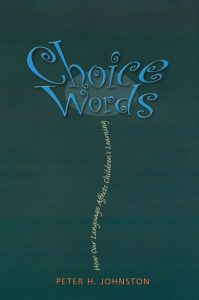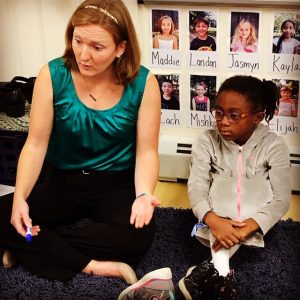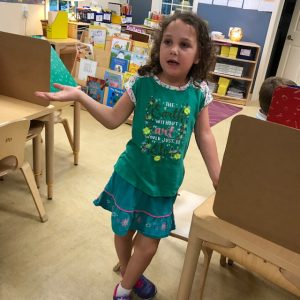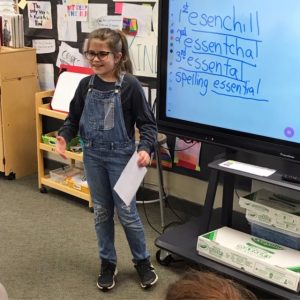 One of my favorite books, first shared with me by a third grade teacher at Moses Brown School in Providence, RI, is Choice Words: How Our Language Affects Children and Learning by Peter H. Johnston. Published in 2004, this 86-page book quickly rose to the top of many of the top-books-for-educators lists. Although the primary audience for this book is teachers, Peter Johnston’s messages can easily be understood and embraced by parents. It is my belief that we are all accountable for what we say. We can all work together to promote a feeling of competency and agency in our children, nurturing their productive identities and capabilities as learners, self-advocates, community members, and achievers.
One of my favorite books, first shared with me by a third grade teacher at Moses Brown School in Providence, RI, is Choice Words: How Our Language Affects Children and Learning by Peter H. Johnston. Published in 2004, this 86-page book quickly rose to the top of many of the top-books-for-educators lists. Although the primary audience for this book is teachers, Peter Johnston’s messages can easily be understood and embraced by parents. It is my belief that we are all accountable for what we say. We can all work together to promote a feeling of competency and agency in our children, nurturing their productive identities and capabilities as learners, self-advocates, community members, and achievers.
“In productive classrooms, teachers don’t just teach children skills, they build emotionally and relationally healthy learning communities. Teachers create intellectual environments that produce not only technically competent students, but also caring, secure, actively literate human beings.  Choice Words shows how teachers accomplish this using their most powerful teaching tool: language. Throughout, Peter Johnston provides examples of apparently ordinary words, phrases, and uses of language that are pivotal in the orchestration of the classroom. Grounded in a study by accomplished literacy teachers, the book demonstrates how the things we say (and don’t say) have surprising consequences for what children learn and for who they become as literate people. Through language, children learn how to become strategic thinkers. In addition, Johnston examines the complex learning that teachers produce in classrooms – which is hard to name and thus is not recognized by tests, by policy-makers, by the general public, and often by teachers themselves, yet is vitally important. This book will be enlightening for anyone who wishes to be more conscious of the many ways their language helps children acquire literacy skills and view the world, their peers, and themselves in new ways.” (Stenhouse Publishers)
Choice Words shows how teachers accomplish this using their most powerful teaching tool: language. Throughout, Peter Johnston provides examples of apparently ordinary words, phrases, and uses of language that are pivotal in the orchestration of the classroom. Grounded in a study by accomplished literacy teachers, the book demonstrates how the things we say (and don’t say) have surprising consequences for what children learn and for who they become as literate people. Through language, children learn how to become strategic thinkers. In addition, Johnston examines the complex learning that teachers produce in classrooms – which is hard to name and thus is not recognized by tests, by policy-makers, by the general public, and often by teachers themselves, yet is vitally important. This book will be enlightening for anyone who wishes to be more conscious of the many ways their language helps children acquire literacy skills and view the world, their peers, and themselves in new ways.” (Stenhouse Publishers)
 Quotes from Choice Words:
Quotes from Choice Words:
“Children make sense of language, and themselves, in the context of it all.”
“Children, just like adults, learn better in a supportive environment in which they can risk trying out new strategies and concepts and stretching themselves intellectually.”
“If nothing else, children should leave school with a sense that if they act, and act strategically, they can accomplish their goals.”
“Having a sense of agency then, is fundamental. Our well-being depends on it. Teacher’s conversations with children help the children build bridges between action and consequence that develop their sense of agency. Children with strong belief in their own agency work harder, focus their attention better, are more interested in their studies, and are less likely to give up when they encounter difficulties than children with a weaker sense of agency.”
 “The effect of soliciting student questions is to cede control of the topic of the conversation to the students, or at least to engage in more balanced negotiation of the topic – provided the questions are taken seriously and followed-up on. The ability or tendency to ask effective questions contributes a great deal to children’s agency, and to their development or critical literacy.”
“The effect of soliciting student questions is to cede control of the topic of the conversation to the students, or at least to engage in more balanced negotiation of the topic – provided the questions are taken seriously and followed-up on. The ability or tendency to ask effective questions contributes a great deal to children’s agency, and to their development or critical literacy.”
“Children who focus on getting praise or on not looking foolish have a much harder time becoming literate than children who focus on engagement in learning activities.”
“If we want to change our words, we need to change our views.”

I love these blog posts, thank you.